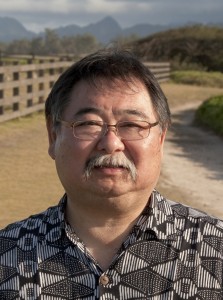
Garrett Hongo was born in the back room of the Hongo Store in Volcano, Hawai`i in 1951. He grew up in Kahuku and Hau`ula on the island of O`ahu and moved to Los Angeles when he was six, much to his everlasting regret. He complained so, his parents sent him back when he was nine, where he lived in Wahiawā and Waimalu with relatives who so hated him, they stuffed him on a plane back to L.A. when he was ten. He grew up fighting from then on, all the way through Gardena High School, where he encountered Shakespeare, Camus, and Sophocles in English classes. They convinced him to try higher education, so he went to Pomona College, managed to graduate, still fighting, and found poetry there under the tutelage of Bert Meyers. He wandered Japan, Michigan, and Seattle thereafter, supporting himself through wits and lies, directing the Asian Exclusion Act from 1975-77, becoming poet-in-residence at the Seattle Arts Commission in 1978. He then gave up wit and went back to graduate school at UC Irvine, studying with the poets Charles Wright, C.K. Williams, and Howard Moss, all of whom averred he deserved hanging. Hongo has subsequently taught at USC, Irvine, Missouri, Houston, and Oregon, where, fool that he was, he directed the MFA Program in Creative Writing from 1989-93. He has written three books of poetry, including Coral Road (Knopf, 2011), edited three anthologies of Asian American literature, and published a book of non-fiction entitled Volcano: A Memoir of Hawai`i (Knopf, 1995). Not among the falsehoods on his resume are two fellowships from the NEA, two from the Rockefeller Foundation, a Guggenheim Fellowship, and the Lamont Poetry Prize from the Academy of American Poets. He is now in semi-retirement and fights no one, having lost all his teeth and suffered from tapioca of the hands. He plays with his daughter, scolds his two grown sons, and loves his wife Shelly Withrow. He is presently completing a book of non-fiction entitled The Perfect Sound: An Autobiography in Stereo. In Eugene, where he lives, they call him, among other things, Distinguished Professor of the College of Arts and Sciences and Professor of Creative Writing at the University of Oregon.
***
LR: As a longtime professor of creative writing at the University of Oregon, what has the relationship between academia and poetry been like in your life?
GH: Academia has provided a space for poetry, actually. We can pursue it seriously this way—in formal classes and workshops. I didn’t fully and consistently connect with my own poetry until I got to an MFA program—at Irvine—where I studied with C.K. Williams, Charles Wright, and Howard Moss. They each gave me something different that I desperately needed—C.K. a big push and a challenge, Charles subtle and constant support and a craftsmanlike approach in answering my own inspirations, and Howard amazing formal wit and geniality in working with my own poetic structures. Since then, as a teacher myself, I try to do things similar for my own students. The poetry workshop has been a haven, though, a place to put the busyness of the world aside and concentrate on poems, poetic thought, the imagination. Academe has been the environment that has supported this most consistently for me.